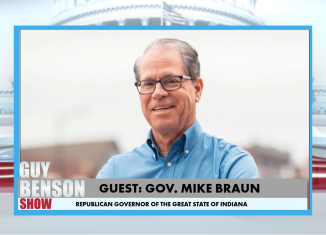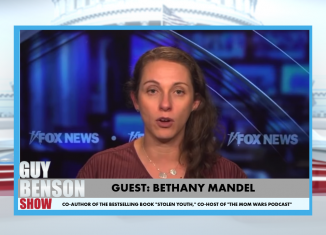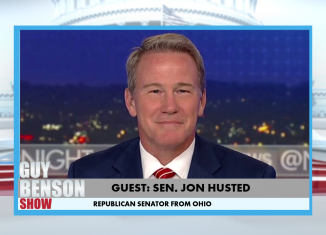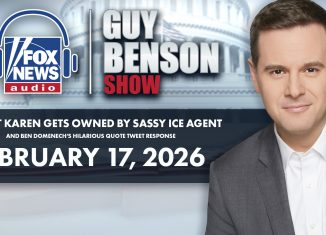CALLED IT: Scarlett Maguire and the British Pollster Who Called the 2024 Election
Scarlett Maguire, director of JL Partners Polls, joined The Guy Benson Show to detail the methods her firm used to accurately predict the 2024 election outcome, despite many other pollsters . Maguire highlighted the missteps of other pollsters who incorrectly sampled data and misread swing states, leading to predictions that fell short of Trump’s decisive win. She also broke down the statistical and anecdotal indicators that signaled Trump’s victory well in advance. Maguire and Benson also touched on British politics, including Keir Starmer’s rise as the new Prime Minister after his July win. Listen to the full interview below!
Full interview:
Listen to the full podcast:
Read the full automated transcript below:
Guy Benson: And with us now, a first time guest to the program, Scarlett Maguire. She is polling director at J. L Partners. And I had the pleasure of meeting her in London last week. One of my speaking engagements was at the Legatum Institute and after our panel about the US elections, we had a private dinner, some of us upstairs, and she was seated directly to my right and I was just very impressed with her. And I think you will be too, as we talk about what her firm was able to achieve about our election here on this side of the pond. Scarlett, it is great to have you here. Welcome.
Scarlett Maguire: Thank you. Thank you for a very kind introduction.
Guy Benson: Absolutely. It was so wonderful to meet you. And I think that was a really meaningful conversation that we had both on the record downstairs and then at dinner afterwards. And I was privileged to be a part of it. And I felt sort of lucky to end up being seated right next to you. And I felt like we really didn’t have quite enough time to satisfy some of my curiosities about the work that you’ve done and about British politics. So we can maybe get into both of those topics here. Starting with I’ll just say this I remember throughout the election, the final months, your firm, JL Partners, would occasionally put out numbers and people who supported Donald Trump would get excited about them. And then in the online discourse, I would see the usual Pooh poohing of any numbers that were good for Trump from sort of the usual suspects, whether it was J. L Partners or some of the others who did a much better job, like Atlas Intel, there was a handful of others that did better than a lot of the mainstream prestigious pollsters here in the United States. And when the dust finally settled, the pollsters that were finding generally good outcomes for Donald Trump were broadly vindicated. And I’ve seen at least some metrics that suggest your firm was the most successful in predicting what happened on November the 5th. Tell us about your polling firm and how you interact with U.S. politics and just give us the scoreboard on how you guys did on November 5th.
Scarlett Maguire: So I work for jail partners. As you said, no introduction. We are a global opinion research, insight and strategy with offices in D.C. and in London. I also have a British accent that you can ignore that we have plenty of American colleagues that do fantastic work and we do a lot of work on the American presidential election in the run up to it. And you’re absolutely right. We were a relative outlier in calling the election for Trump. Since early September, we were saying that not only was Trump going to win the Electoral College, but that that was going to be a decisive win. We have him on 312 Electoral College votes for 25 out of the 30 days running up to the presidential election. And we also said that he was going to win the popular vote. And I think it’s right that you draw attention in your introduction to the backlash online that you can get, because I think this is why. Well, this is why there are a lot of other pollsters were, I think, herding slightly and hedging their bets because you do catch an awful lot of flack if you’re an outlier, especially if you are an outlier in favor of Trump and the Republican Party. And I think that puts a lot of people off.
Guy Benson: So you had Trump winning 312 electoral votes and the popular vote and. By golly. Sounds pretty accurate to me. You were. Yes. Something of an outlier in that respect. There were some others who were there with you. But you’re right, many others were not. There was a huge amount of hurting. And that’s a polling term. It seemed like a lot of the main pollsters just said, all right, everything’s one point or zero points, everything’s tied or one point. All the swing states are that close. And when you had like every single Pennsylvania poll, with a handful of exceptions, showing that it’s like, okay, is that really statistically possible or are they putting their thumb on the scale? I think there was a little bit of that going on. What people in the audience, Scarlet, might be thinking is, okay, well, this is a firm that I haven’t really heard of before, a pollster that I’m not that familiar with. Maybe this woman sounds delightful in that we love the British accent, but maybe they got a little lucky, right? Maybe they kind of had their algorithm or whatever your process was, and it turned out to be right this time. But that doesn’t mean that they’d be right again in the future. And I know this is a very imprecise science. I guess the question is, what was your methodology and why do you think maybe it wasn’t just dumb luck and actually skill that led to this bang on result that you guys had?
Scarlett Maguire: Yeah. So I think polling is not an imprecise science is certainly a subjective one. And I think that nature of that element of polling often goes unnoticed. I think we start from first principles, which is to actually listen to voters. Now that sounds obvious, but I really do think there are a lot of pollsters that even is not putting their stuff on the scale we’re getting. We’re getting data back from what people were saying, and we’re not actually listening to what that data was telling, to what people were telling them. To just put that aside for a minute. Our methodology was a bit different from a lot of other pollsters, and I can outline it both in terms of our polling and our modeling. I’ll start with our polling because our modeling is relatively dependent on our polling sites. Our polling, we used a mixed method approach. That’s what we use when we do sort of gold standard election polls in America. That means we are not just relying on bringing people up on a landline phone like I was in Iowa, nor are we relying on very large online panels which were incredibly inaccurate, especially in the 2020 presidential cycle. We do a mix of text to web semester web phone calls online, and also crucially, we stop people as they’re doing things like playing games on their mobile phone and say, Would you like to win ten points in this game? Just take this quick survey. Lastly, we find this is a much better way of reaching harder to reach and less engaged voters. I think then secondly, there’s a question about what do you do when you reach these harder to engage low propensity voters? An awful lot of pollsters were not waiting to include enough people who hadn’t voted before. We were seeing in our polling that lots of people who haven’t voted in previous elections are saying, I’m going to vote this time. And most of the time they’re coming out and voting for Donald Trump. Now we also see more questions, but we made, I think, a bit more of a finely tuned assumption about what they were going to show up. And we were quite bold in thinking that they would. And that certainly helped drive Donald Trump’s victory. A couple of other things we did as well as we were running focus groups throughout the campaign. We think it is incredibly important to do this. Qualitative research alongside your quantitative research is a fantastic sense check. So when we were doing that research, we did not see that women were going to be motivated by the issue of abortion to come out for the Democrats like they never had done before. Far from it. We’ve got a very good sense of what people’s priorities were. And we also crucially picked up on the movements of ethnic minorities, which we’re picking up in our identity. But it meant that we then had the guts to stand by our data and say, no, I do think Donald Trump is going to win a high percentage of Hispanic men, even though that has not happened before and is relatively unprecedented. It matches up with what we’re doing in interviews and in focus groups. And so we are going to stick by our data even if it becomes an uncomfortable place to be in times of public scrutiny. But we thought that was important. Well, then just quickly touch on modeling. So when, you know, people at home will be looking at sort of poll aggregators like, say, FiveThirtyEight or Nate Silver and saying, I think Trump’s going to win the Electoral College or Harris is going to win the Electoral College or it’s a toss up, it’s too close to call. They’ll all be using aggregate models, so they’ll be feeding their own polls, but also lots of other people’s polls into this average. But to do that, to go back to that point I first made about this being subjective, they’ll be making some quite crucial decisions. And this is where I think you can set yourself apart as a pollster. So for us, some of our decisions that were a bit different from other people’s included. Uprating So putting more importance on ballot tests, no head to heads. So if, for example, RFK Junior was on the ballot in a state, we included polls that had him in that polling, not just a head to head between Harris and Trump. We waited our own polling because we took a lot more stock in it for the reasons I just outlined about our confidence and our messaging. And then I think this is a really important one. We did not give Kamala Harris any incumbency boost. Most pollsters did, because historically people coming in as an incumbent had benefited in a US presidential election, plus the incumbency, incumbency and kicking everywhere. Secondly, this is an almost record unpopular administration. And so think she wasn’t even really incumbent. So we certainly didn’t give her a boost. Yeah. And it’s all these decisions which I think then feed in June actually projections. I do think there is a slight this ingenuity amongst the polling community when it comes to this question of things being too close to call. This drive me a bit mad actually, because people would look at the popular votes and see them tied to President Trump or even see Trump slightly ahead and say, look at this, they’re tied. This election is too close to call. Now, you know, we know the listeners know that they were tied, that actually this is very, very likely. This is very likely to go Trump’s way. He had a huge deficit. Polls underestimated him two cycles before. And also the Democrats are at a disadvantage when it comes to the popular vote. So the very fact we. Even time does not mean that this election is close to call. In fact, it means that things are probably stacked in Trump’s saber. I think it was. That’s the commentary around it from pollsters and also from media organizations. I think that was what was missing.
Guy Benson: Just so much really interesting substance there in that answer you just gave us. And I think what I picked up on in particular was this qualitative versus quantitative. Balancing act and the focus groups that you did, because it would seem to me just listening to you explain it, if your numbers were showing one thing and then you were talking to real people all across the country over and over again and you were hearing something that didn’t really align with the numbers, that might be a red flag, like maybe the numbers are missing something or vice versa. The focus groups are bearing out what appear to be potentially controversial stories being told by the numbers themselves. It seems almost like a gut check, a reality check to test your own work with actual real people. And you said it’s kind of an elementary point. We want to listen to what voters are actually telling us. You gave Scarlet a few examples of it, but maybe if you can think of one very specific anecdote not to put you on the spot, but where you heard something or there was some phenomenon or a specific voter or something that happened in the anecdotal realm that in your mind led you to believe that you were on the right path statistically.
Scarlett Maguire: Absolutely. I’ll give you a couple of examples. Actually, the first one that comes to mind, which I think was brought, was absolutely borne out on Election Day and also again made us trust our data a bit more was we were really strongly picking up on particular black men’s resistance to voting or reluctance to vote for Kamala Harris. It was very clear that she was not convincing them in the way that she needed to do so. And we heard that countless times. They thought she was weak because she didn’t know what she was doing. They thought she would be bad on the world stage and they just didn’t like her very much. They didn’t feel like she represented them or particularly spoke to them and they didn’t think she was a strong enough candidate. We heard about several times from black voters, especially in swing states where we were conducting a lot of these focus groups. And the second example I’ll give is talking. We talked to women in Arizona shortly before the election, and this one really stuck with me. It was before the Iowa poll, the Iowa poll came out. People were very excited and thought the women were going to deliver the election to Harris by voting for her in droves. That did not happen in this focus group. These women, some of them were pro-life. Some of them were very much pro-choice. And the ones that were pro-choice were fascinating because they said, well, Trump said he’s not going to implement a national abortion ban. I’m going to vote pro-choice and the down ballot measures in Arizona. I’m gonna vote Trump. I’ve got more important things to worry about. I care about the economy and I really care about seeing the southern border. And we were hearing that from women not just in Arizona and across the same state. And how about so many times or formulation of that? So many times. But when again, this answer to any of the poll came out, I just didn’t understand it did not join with what we’ve been hearing. And again, that I think that’s a really important example of where these focus groups can be that gut check that you just talked about.
Guy Benson: Let’s move to your side of the Atlantic. I follow British politics more closely than most Americans, certainly, but less closely than you. That’s for sure. You had your election on July 4th, ironically, of this year, and it went Labor’s way in a big way, at least in terms of the seats won, but not really in terms of the percentage of votes won. I know you have a completely different system than we do. It’s baffling to me in some ways, and I’m sure the same is true in reverse, but it is what it is. And so this historically pretty small percentage in the 30s produced a huge majority in Parliament for Labor. And we have, at least in the U.S., what’s known as a honeymoon. Donald Trump didn’t really get a polling honeymoon last time. He’s getting one this time. Whatever honeymoon, if that is a phenomenon that exists in the UK, whatever honeymoon existed for Mr. Starmer and the Labor government, if it was there at all, it’s gone. The polling looks pretty disastrous for them already. It’s it’s been just a matter of months. What do you think is going on there and what are you seeing in the polling in the UK? Because on the center right you have the Tories, the Conservative Party that govern for 14 years and then lost. And it seems like a lot of their base is bleeding over to this new party called Reform and Nigel Farage and sort of a more right wing populist movement. Is that a coalition that can work together to beat labor? I know that we’re years off from the next general election, but I’m sort of fascinated to see some of these tectonic plates moving around in British politics.
Scarlett Maguire: So, Guy, you’re incredibly sort of tuned up on British politics. I was a spot on appraisal. I think of the situation going on here. And indeed, I think the biggest question going forward at determining what will happen at the next election. You’re absolutely right. It might seem odd to us listeners, but Keir Starmer got a massive landslide, a majority of 170 seats in the UK Parliament, but he did that of only 33% of the vote. And I’ll add something to that. We have 60% turnout now. Turnout in UK elections is normally higher than the US election, so that wouldn’t be unlike the US election. That’s very, very low for UK elections and indicated a lack of enthusiasm on the part of voters. And when you take those two statistics together, you can see quite quickly. Keir Starmer only won 2 in 10 votes from the eligible electorate in the UK, which means that from the very beginning I think it was going to be quite difficult and precarious situation for him despite this big parliamentary majority that he got himself in the House of Commons. But I think things have gone worse, even quicker than a lot of people expected. And certainly any honeymoon has more than ended. When we polled in the election campaign, he was the only political figure in positive territory voters. He is now the least popular politician of any politician we polled, which is extraordinary. And so far, that looks like he will continue to go down that precipitous fall and his favourability ratings will only get worse. His chancellor. So his main economic person is in a similar boat, just slightly above him, but very much under water. And again, looks like there’s only one direction that they’re going. And this is quite extraordinary. It’s extraordinary because it’s not we are a two party system historically, much like you are in America, in the UK and more. Conventional wisdom would say if Labor are doing badly, conservatives will start doing better. That the center right party that you were talking about, the Tories. I’m that is not happening. Instead, it looks like the momentum is for Reform UK. Nigel Farage is sort of start ups. More populist policy on the right made a big play on immigration, which which is what I’d be unhappy with. I’m happy with how the Conservatives have handed it and they are going from strength to strength in the polls now. They’ve said that they want to destroy the conservatives because the Conservatives did such a bad job for the 14 years, 14 years that they were in power. Will they stick to that by the time the next election? We’ll have to see. But to me, my instinct is, you know, we’ve got a long time to our next election is not due to be until 2029 is that the conservatives will need to come to some sort of arrangement with Reform UK or risk being obliterated again, much like they were at this election.
Guy Benson: Yeah, and they might need each other in some ways because of your first past the post system and the parliamentary system that we were also referencing. Well, Scarlett Maguire of JL Partners has been our guest here on The Guy Benson Show. Scarlett, again, a real pleasure meeting you last week in London. I hope that we can return the favor in the U.S. some time. I know you spend some time in Washington, in New York. We’d love to have you in studio at some point or back by phone. We would love to keep this conversation going if you’re amenable.
Scarlett Maguire: Such a pleasure to meet you Guy. I’d love that.
Guy Benson: Thank you so much. That’s Scarlett Maguire on The Guy Benson Show. With that, our final hour coming up next. Dr. Shelby Steele joins us right after this.







